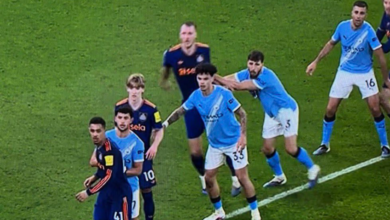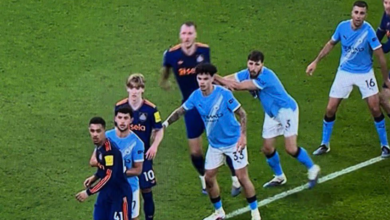Just Immediately After Nothingham winning , Fifa released annother news

The race for Champions League qualification has reached unprecedented levels of intensity as the 2024/25 Premier League season enters its final stretch. With four matches remaining for most clubs, the battle for Europe’s most prestigious competition has never been tighter or more fiercely contested. Liverpool have secured their position as worthy champions, while Arsenal stand firmly as the second-best team in the league—despite Newcastle United’s impressive hat-trick of victories against the Gunners this season. The real drama, however, unfolds in the struggle for the remaining Champions League spots.
This season has witnessed remarkable narratives: Newcastle United’s resurgence following their trophy drought-breaking triumph at Wembley, Nottingham Forest’s impressive return to Premier League relevance, Manchester City’s customary late-season form surge shadowed by the looming 115 charges, Chelsea’s experiment with a mercenary squad built on an “Americanized philosophy,” and Aston Villa’s media-fueled hype machine encountering reality checks after recent defeats. Each club brings a unique storyline to this compelling Champions League qualification saga.
The intense competition for Champions League places represents more than just sporting achievement—it symbolizes the potential restructuring of English football’s elite hierarchy. The traditional “Big Six” monopoly faces genuine challenges from ambitious clubs with strategic vision and substantial resources. Newcastle’s position, secured through consistent performances before and after their cup triumph, places them in an advantageous position, yet nothing is guaranteed with four crucial matches remaining.
Current League Standings: The Numbers Behind the Battle
With four matches remaining, the current league table presents a fascinating picture. Liverpool have secured the title with Arsenal comfortably in second place. Newcastle United currently occupy third position, followed by Manchester City, Chelsea, and Nottingham Forest (who have a game in hand), with Aston Villa sitting seventh. This configuration represents a significant departure from traditional Premier League hierarchies, with established powers like Manchester United and Tottenham conspicuously absent from the European qualification conversation.
The points differential between these contenders remains minimal, creating a scenario where every match, every goal, and every point could prove decisive. The pressure mounts with each passing fixture, as teams not only battle their direct opponents but also their own psychological barriers and physical limitations. For clubs like Newcastle and Forest, this represents a generational opportunity to establish themselves among Europe’s elite; for Manchester City and Chelsea, it’s about maintaining their expected status; for Aston Villa, it’s proving their progress is substantial rather than illusory.
Statistical analysis reveals fascinating patterns in this season’s competition. Newcastle’s defensive solidity has formed the foundation of their success, while their ability to overcome top-six opposition (particularly Arsenal) demonstrates their elite credentials. Nottingham Forest have relied on home form and tactical discipline, embodying Nuno Espirito Santo’s pragmatic approach. Manchester City maintain their position through superior goal difference and consistent point accumulation, despite occasional stumbles. Chelsea’s inconsistency reflects their hastily assembled squad’s struggles for cohesion, while Aston Villa’s recent form decline suggests they may have peaked too early.
Newcastle United’s Renaissance: From Trophy Triumph to European Ambitions
Newcastle United’s journey this season epitomizes the club’s remarkable transformation under Saudi ownership and Eddie Howe’s astute management. Their cup triumph at Wembley ended a painful trophy drought and could have easily marked a psychological endpoint for their season’s ambitions. Instead, the Magpies have used that success as a springboard for further achievements, maintaining impressive form despite temporarily losing their “illustrious leader King Eddie.”
The club’s success stems from brilliant recruitment, tactical evolution, and a revitalized connection with their passionate fanbase. Players who arrived as speculative investments have developed into Premier League stars, while established talents have reached new performance levels under Howe’s guidance. The blend of physicality, technical quality, and tactical discipline has enabled Newcastle to compete consistently against the league’s elite teams, demonstrated by their hat-trick of victories against Arsenal.
What makes Newcastle’s achievement more impressive is their ability to manage multiple competitions while maintaining league performance. Unlike previous iterations that wilted under pressure, this Newcastle squad has developed mental resilience alongside technical proficiency. Their capacity to navigate European commitments while maintaining domestic form suggests they possess the depth and quality necessary for Champions League participation.
The final four fixtures will test Newcastle’s resolve, but their position—with qualification destiny in their own hands—represents enormous progress. For a club that languished in mid-table mediocrity or relegation battles for much of the Mike Ashley era, competing for Champions League places represents a transformative achievement that validates their ambitious project.
Manchester City: Form Surge Amidst Legal Cloud
Manchester City’s late-season form improvement follows a familiar pattern established during their dominance under Pep Guardiola. When championships hang in the balance, City typically discover another performance level that separates them from competitors. While Liverpool have secured the title this season, City’s resurgence has kept them firmly in the Champions League qualification mix after earlier inconsistency threatened their European status.
However, an unprecedented factor potentially impacts City’s future: the 115 charges hanging over the club relating to alleged financial irregularities. This legal sword of Damocles represents the greatest existential threat to City’s elite status since Sheikh Mansour’s 2008 takeover. The potential consequences—from points deductions to relegation—create uncertainty that even Guardiola’s tactical genius cannot address.
On the pitch, City demonstrate their customary technical excellence and possession dominance, though with less ruthless efficiency than previous seasons. Their squad depth continues to offer Guardiola tactical flexibility, enabling rotation without significant quality reduction. Despite Liverpool securing the title, City’s late-season form suggests they remain formidable opponents who will likely secure Champions League qualification through footballing merit—though the legal proceedings may ultimately override sporting achievement.
The interplay between City’s on-field excellence and off-field legal jeopardy creates a fascinating subplot in this Champions League qualification drama. Their performances exist within a context of potential punishment that could dramatically alter English football’s competitive landscape and hierarchy in coming seasons.
Nottingham Forest: The Fairy Tale Continues
Nottingham Forest’s presence in the Champions League conversation represents perhaps the season’s most heartwarming narrative. Under Nuno Espirito Santo’s pragmatic guidance, the two-time European Cup winners have defied expectations since their Premier League return. Their position, with a game in hand over competitors, makes them genuine contenders for a qualification place that would complete one of football’s most remarkable comeback stories.
Forest’s success stems from tactical discipline, strategic recruitment, and the passionate support generated by their historic City Ground stadium. Nuno has created a team greater than the sum of its individual parts, blending experienced professionals with emerging talents into a competitive unit capable of competing against wealthier opponents. Their defensive organization forms the platform for quick transitions that capitalize on opposition vulnerabilities.
What makes Forest’s achievement particularly noteworthy is the contrast with expectations. Many predicted relegation battles following their promotion; instead, they’ve established Premier League security and now pursue European ambitions. Their FA Cup semi-final disappointment against Manchester United represents a missed opportunity for silverware but may ultimately benefit their league campaign through reduced fixture congestion.
For neutral observers, Forest’s qualification would represent a refreshing counterpoint to the financial determinism that often dictates Premier League success. Their potential participation would reconnect the club with their glorious European heritage while demonstrating that strategic planning and coaching excellence can still overcome financial disparities in modern football.
Chelsea’s Mercenary Experiment
Chelsea’s qualification campaign reflects the turbulent nature of their ownership transition and subsequent strategy shift. Described as “an enigma, a team of mercenaries banded together by an Americanized philosophy,” the Blues embody football’s modern tension between traditional sporting values and commercially-driven approaches to squad building.
The Todd Boehly/Clearlake Capital ownership has implemented an unprecedented recruitment strategy, accumulating players without apparent tactical coherence. This approach has yielded a bloated squad with imbalanced positional distribution and questionable chemistry. Despite enormous expenditure, Chelsea’s performances have lacked consistency and identity, though their individual talent occasionally produces impressive results.
Questions persist about the sustainability of Chelsea’s approach, both financially and competitively. The enormous wage bill, extended contracts, and FFP considerations create potential long-term issues even if short-term Champions League qualification succeeds. Their qualification push therefore carries existential significance beyond mere sporting achievement—it represents validation for a controversial methodology that challenges traditional football orthodoxy.
Chelsea’s remaining fixtures will test not just their players’ technical abilities but also their collective commitment to a shared goal. Without the cultural cohesion that characterizes more established squads, Chelsea must rely on individual brilliance and professional pride to secure crucial points. Their qualification would represent a triumph of talent acquisition over strategic coherence—a potentially concerning precedent for football’s competitive balance.
Aston Villa: Media Darlings Face Reality
Aston Villa’s recent trajectory encapsulates both impressive progress and media overexuberance. Under Unai Emery’s astute management, Villa have transformed from relegation candidates to European contenders, playing attractive football with tactical sophistication. Their comprehensive victory over Newcastle United showcased their quality at its peak, suggesting they could establish themselves among the Premier League elite.
However, recent defeats—particularly their FA Cup semi-final disappointment—have exposed limitations within Villa’s squad and project. The suggestion of “disharmony in Unai Emery’s camp” hints at internal tensions that could derail their qualification hopes. Questions about loan signings Marcus Rashford and Marco Asensio further complicate their narrative, with neither fully convincing despite their illustrious reputations.
The media’s apparent favoritism toward Villa—described as wanting them to be “leaders of the revolution” against the “Septic Six cartel”—reflects football journalism’s tendency to construct compelling narratives that sometimes outpace reality. Villa’s genuine progress has been amplified into premature declarations of elite status, creating expectations that their squad depth and resources may not yet support.
With their seventh-place position and recent form decline, Villa appear to be fading from the Champions League conversation. Their project remains impressive and forward-looking, but their current trajectory suggests Europa League participation represents a more realistic outcome this season—a significant achievement nonetheless for a club rebuilding from recent struggles.
The Impact of European Competition on Club Development
Champions League qualification represents more than prestige and financial reward—it fundamentally alters a club’s developmental trajectory and competitive status. The revenue from participation enables squad reinforcement, infrastructure investment, and enhanced commercial opportunities. Perhaps more importantly, Champions League status attracts elite players who might otherwise reject clubs operating below Europe’s top competition.
For Newcastle, qualification would accelerate their project toward sustained elite status, providing resources and attraction power to complement their ambition. For Forest, it would represent both historical reconnection and future validation, potentially establishing them as a Premier League fixture rather than a temporary visitor. For Manchester City, it maintains their expected status while they address legal challenges. For Chelsea, it justifies their unconventional approach to squad building. For Villa, it would confirm their progress has substance beyond media hype.
The consequences of missing Champions League qualification are equally significant. The financial gap between Europe’s elite competition and the Europa League creates a potential competitive imbalance that can persist across multiple seasons. Additionally, key players may seek transfers to secure Champions League participation elsewhere, potentially triggering talent drains that undermine long-term project viability.
This high-stakes competition therefore carries implications extending far beyond this season’s league table. The clubs securing Champions League places gain accelerated development potential, while those narrowly missing qualification face challenging recalibrations of expectations and resources.
The Final Fixtures: Predicting the Outcome
With four matches remaining for most contenders, every point, goal, and decision could prove decisive in determining Champions League qualification. Newcastle appear well-positioned despite their recent defeat to Aston Villa, with their superior points position and strong performances against top opposition suggesting they possess the quality and mentality to secure their position.
Manchester City’s traditional late-season form makes them likely qualification candidates, though the 115 charges create unprecedented uncertainty regarding their future status. Chelsea’s inconsistency makes them vulnerable despite their talent advantage, with squad harmony potentially determining whether they can produce the consistent performances required. Forest’s game in hand offers them a crucial advantage, though their relative inexperience in high-pressure scenarios could prove challenging.
Aston Villa, despite their impressive season, appear to be fading from contention following consecutive defeats that have damaged both points accumulation and confidence. Their remaining fixtures now represent an opportunity to secure Europa League participation—a significant achievement that would validate their progress while establishing a platform for future Champions League ambitions.
Prediction models suggest Newcastle and Manchester City will likely join Liverpool and Arsenal in securing Champions League places, with Forest narrowly missing out despite their impressive campaign. Chelsea’s inconsistency will likely cost them, while Villa’s recent form decline appears terminal to their qualification hopes.
Beyond This Season: The Changing Premier League Landscape
This season’s Champions League qualification battle represents more than a temporary competitive anomaly—it potentially signals a fundamental restructuring of Premier League power dynamics. The traditional “Big Six” cartel faces unprecedented challenges from clubs with strategic vision, substantial resources, and intelligent leadership. Newcastle’s Saudi backing, Forest’s historical reconnection, and Villa’s ambitious American ownership have created multiple centers of potential power beyond established elites.
This democratization of ambition creates both opportunities and challenges for English football. Increased competition enhances the Premier League’s entertainment value and global appeal, while potentially reducing the predictability that has characterized European qualification in recent decades. However, it also potentially concentrates resources among a slightly larger elite group, potentially widening the gap between European contenders and the remaining Premier League clubs.
The potential impact of Manchester City’s 115 charges adds further complexity to this evolving landscape. Substantial punishment could temporarily remove a dominant force from elite competition, creating opportunities for emerging clubs to establish Champions League credentials. This legal process therefore carries significance beyond City’s immediate future, potentially reshaping competitive hierarchies across multiple seasons.
Whatever the outcome of this season’s qualification battle, the Premier League appears to be entering a new era of competitive diversity at its upper levels. The “Big Six” may be evolving into a more fluid “Big Eight” or “Big Nine,” with membership determined by strategic excellence rather than historical status or financial dominance alone.
Conclusion: Everything to Play For
As the Premier League enters its final four fixtures, the Champions League qualification battle remains delicately poised. Newcastle United’s position appears strongest, with qualification destiny in their own hands following their impressive post-Wembley form. Manchester City’s traditional late-season surge makes them formidable contenders despite the legal uncertainty surrounding their future. Nottingham Forest’s fairy tale continues with their game in hand offering crucial advantage. Chelsea’s mercenary experiment faces its definitive test, while Aston Villa’s media-fueled hype confronts the reality of consecutive defeats.
This compelling contest represents football at its most dramatic and consequential. Beyond the immediate sporting achievement, Champions League qualification fundamentally alters a club’s developmental trajectory, financial reality, and competitive status. The next four fixtures will determine not just European participation next season but potentially club trajectories for years to come.
For neutral observers, this unprecedentedly tight qualification battle offers refreshing competitive diversity in a league often criticized for predictable hierarchy. For supporters of the contending clubs, it represents weeks of exquisite tension and potential glory. Whatever the outcome, this season’s Champions League qualification drama exemplifies why the Premier League remains global football’s most compelling domestic competition—where established power meets emerging ambition in a genuine contest of sporting merit.















